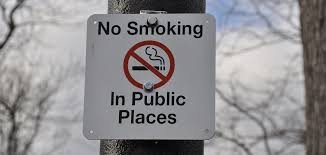Zimbabwe News Update
📅 Published: August 26, 2025
📰 Source: zimbabwesituation
Curated by AllZimNews.com
📅 Published: August 26, 2025
📰 Source: zimbabwesituation
Curated by AllZimNews.com
While the law prohibits smoking in some public spaces — like buses, halls and eating places, it, however, does not address smoking in open but congested areas where people gather.
Mapiki expressed concern over the health risks caused by passive smoking especially to vulnerable groups. “Children and vulnerable populations are particularly at risk, as their developing bodies are more vulnerable to the harmful effects of tobacco smoke,” he said.
Mapiki said many people continued to smoke at places like bus stops, markets and on crowded city streets without facing any consequences due to weak monitoring and lack of accountability.
He said the amendment to SI 264 should include high-traffic public areas such as towns, bus termini and markets as prohibited smoking zones.
Mapiki called on the Health and Child Care ministry to lead public awareness campaigns to educate citizens about the dangers of passive smoking and the importance of complying with tobacco control laws. “Without public education, we are fighting a silent battle,” he said, calling for strong enforcement mechanisms. “It is well-established that smoking is not a crime and every individual has the right to smoke at their own discretion.
However, when smoking, they should ensure that it does not adversely affect non-smokers. “The Public Health (Control of Tobacco) Regulations, 2002 (Statutory Instrument 264 of 2002), prohibit smoking in designated public places such as public transport, public halls, public gatherings and eating places. ” Added Mapiki: “These regulations were established to protect non-smokers from the harmful effects of second-hand smoke and to promote public health. “However, while these measures are commendable, they do not encompass all public spaces where individuals congregate, leaving gaps in our tobacco control framework. ” He said he had identified significant dangers associated with passive smoking. “It was noted that exposure to passive smoke, also known as second-hand smoke or environmental tobacco smoke, poses significant health risks to non-smokers,” the MP said. “When non-smokers breathe in smoke exhaled by smokers or emanating from burning tobacco products, they inhale thousands of chemicals, many of which are toxic and cancer-causing. “Passive smoking has been linked to an increased risk of developing serious health problems, including lung cancer, heart disease and stroke. ” He said passive smoking was associated with an increased risk of sudden infant death syndrome and can worsen symptoms of existing conditions such as bronchitis and pneumonia in babies. “In adults, passive smoking can cause respiratory problems, including chronic obstructive pulmonary disease and can also increase the risk of breast cancer in non-smoking women,” Mapiki said. “Overall, the health risks associated with passive smoking underscore the importance of creating smoke-free environments to protest the health of non-smokers. “The global community has recognised the imperative of smoke-free environments.
Many nations have enacted comprehensive legislation, providing robust models for Zimbabwe to emulate. ” Some countries including Ireland, Norway, the United Kingdom, Canada, Australia and New Zealand, have implemented near-total bans on smoking in public places and workplaces. “These bans are usually comprehensive, covering indoor public spaces, transport and often extending to outdoor areas adjacent to building entrances,” he said, adding that it was difficult to walk on streets where people smoke without regard for others. “This is particularly concerning in public areas like bus stops, which are usually crowded and smokers pose a significant health risk to those exposed to passive smoking.
This is primarily due to lack of enforcement leading to inconsistent application of the law,” Mapiki said. “Without strict laws and enforcement to ban smoking in public areas, passive smoking will remain a significant public health issue.
Public awareness campaigns and penalties for smokers are crucial to creating a culture that discourages smoking in public. “Fines or arrests for public smoking can help to deter this behaviour and protect the majority’s right to breathe clean air.
All necessary steps should be taken to provide a healthy environment for everyone. ” The legislator also called for the drafting a comprehensive Tobacco Control Act to ban smoking in enclosed public places and workplaces.
There should be clear, deterrent penalties for individuals caught smoking in prohibited areas and for establishment owners and managers who fail to enforce the ban, he said. “Penalties should include fines, with escalating consequences for repeat offenders, potentially including temporary closure of business,” he said.
Mapiki also called for comprehensive training for enforcement officers on the new legislation, inspection procedures and evidence. “Ensure strong coordination between the Ministry of Health and Child Care; Ministry of Finance, Economic Development and Investment Promotion; Ministry of Environment; Ministry of Tourism and Hospitality Industry; Ministry of Home Affairs and Cultural Heritage (for enforcement), and other relevant ministries,” he said.
📖 Continue Reading
This is a preview of the full article. To read the complete story, click the button below to visit zimbabwesituation.
🔗 Read Full Article on zimbabwesituation
AllZimNews aggregates content from various trusted sources to keep you informed.
📰 Source:
zimbabwesituation
Aggregated by AllZimNews – Your trusted source for Zimbabwe news
